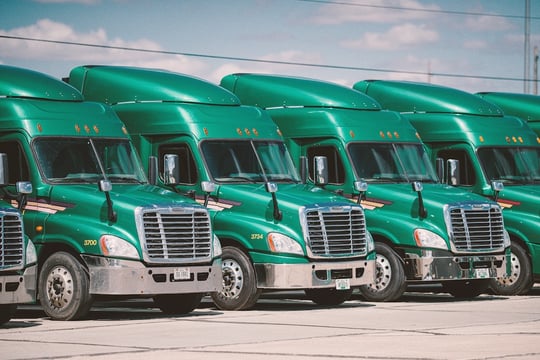Fleet management is the efficient and effective organization and operation of a company's vehicle fleet. It includes the management of vehicles, drivers, and related equipment and services, such as fuel and maintenance. Fleet management helps companies optimize vehicle usage, reduce costs, and improve safety and compliance.
Types of Fleet Management Companies
Many companies offer fleet management services, including standalone companies and divisions of larger organizations. These companies often use specialized software and hardware to track and manage their fleet, including GPS tracking devices and telematics systems. Telematics systems can provide real-time data on a vehicle's location, speed, and other performance metrics, as well as alerts for maintenance or safety issues.
Fleet Management at Service-based Businesses
Fleet management is an important aspect of service-based businesses that rely on vehicles to support their operations. These businesses may include delivery services, transportation companies, and service providers that make house calls or visits to customers.
Effective fleet management can help service-based businesses improve efficiency, reduce costs, and ensure their vehicles' and drivers' safety and compliance. This may include using GPS tracking and telematics systems to optimize routes and schedules, managing fuel usage and maintenance, and providing driver training and certification programs.
Service-based businesses may also need to consider additional factors in their fleet management strategy, such as the type of vehicles needed for their operations and the type of services they provide. For example, a delivery company may need a fleet of smaller, fuel-efficient vehicles. In contrast, a transportation company may require larger, more specialized vehicles.
In addition to traditional fleet management services, service-based businesses may also benefit from specialized software and hardware solutions tailored to their specific needs. For example, a service provider may need scheduling software that can optimize routes and appointments based on the location and availability of technicians.
Fleet Management Devices
Hardware and equipment used in fleet management can include GPS tracking devices, telematics systems, and other types of sensors and monitoring devices. These devices may be installed on individual vehicles or integrated into a centralized system for managing multiple vehicles.
GPS (Global Positioning System) devices are an important part of fleet management. These devices use satellite technology to determine the location of a vehicle in real-time, allowing fleet managers to track the movement and performance of their vehicles. GPS devices can be installed on individual vehicles or integrated into a centralized fleet management system.
Many GPS devices are available for fleet management, ranging from simple tracking devices to more complex telematics systems. Basic GPS tracking devices typically provide the location of a vehicle in real-time and the ability to view the vehicle's past movements. More advanced GPS systems may include additional features such as real-time traffic updates, speed tracking, and alert notifications for maintenance or safety issues.
GPS devices can provide a range of benefits for fleet management, including improved efficiency, increased safety, enhanced compliance, and reduced costs.
Improved efficiency
By tracking the location and performance of vehicles in real time, fleet managers can optimize routes and schedules to reduce fuel costs and increase efficiency. There are several ways this is achieved.
Increased safety
GPS devices can alert managers to unsafe driving behaviors, such as speeding or sudden stops, allowing them to take corrective action to improve security.
Enhanced compliance
GPS devices can help ensure that vehicles and drivers are compliant with relevant regulations and laws, such as those related to safety and emissions.
Reduced costs
GPS devices can help identify areas for cost savings, such as placing the most fuel-efficient routes or identifying maintenance issues before they become significant problems.
GPS devices are a valuable tool for fleet management, providing real-time data and insights that can help improve the efficiency and effectiveness of a company's vehicle fleet.
Fleet Management Modules
Modules are specialized software programs that can be added to a fleet management system to provide additional functionality. These modules may include features such as routing and dispatch, fuel management, and maintenance schedule.
Software modules are specialized programs that can be added to a fleet management system to provide additional functionality. These modules may include features such as routing and dispatch, fuel management, and maintenance schedule.
Routing and dispatch software
Routing and dispatch software modules can help optimize routes and schedules for fleet vehicles, reducing fuel costs and improving efficiency. These modules may use real-time data from GPS tracking and telematics systems to identify the most efficient routes and schedule deliveries or pickups.
Fleet management software companies may use software and GPS tracking to optimize routes and schedules, helping drivers to reduce fuel costs and improve efficiency.
Fuel management software
Fuel management software modules can help track fuel usage and identify ways to reduce costs. This may include real-time fuel tracking, alerts for unusual fuel usage, and reports on fuel efficiency.
Maintenance scheduling software
Maintenance scheduling software modules can help schedule and track routine maintenance for fleet vehicles and manage any repairs that may be needed. These modules may include alerts for upcoming maintenance, tracking of maintenance history, and the ability to schedule maintenance appointments.
These software modules can provide a range of valuable features and functionality for fleet management systems, helping companies optimize the use of their vehicles and reduce costs.
In addition to tracking and monitoring vehicles, fleet management companies may also provide various other services, such as fuel management, maintenance scheduling, and driver training. Some fleet management companies also offer financing and leasing options for vehicles.
Fleet management services can cover various activities, including vehicle acquisition, maintenance, fuel management, driver management, routing and dispatch, vehicle tracking, and compliance.
Driver management
Fleet management software companies may provide information that leads to training and certification programs for drivers. Because tracking driver performance and compliance with safety regulations is more automated with a fleet tracking solution identifying who needs training is much easier.
Vehicle tracking and compliance
Fleet management companies can help ensure that vehicles and drivers comply with relevant regulations and laws related to safety and emissions.
Various providers and services are also available to support fleet management. These include fuel providers, maintenance and repair services, and driver training and certification programs.
Some examples of the types of training provided to fleet drivers include:
- Defensive driving courses for fleet drivers
- Vehicle operation
- Compliance
- Professional development
- Hazardous materials handling
- Emergency response
Defensive driving courses for fleet drivers
Defensive driving courses teach drivers how to anticipate and avoid potential hazards on the road, such as other vehicles, pedestrians, and animals. These courses can help reduce the risk of accidents and improve the overall safety of a company's vehicle fleet.
Vehicle operation
Drivers may need training to safely operate specific types of vehicles, such as delivery trucks or buses. This training may include information on adequately loading and unloading cargo and using and maintaining the car.
Compliance
Drivers may need to be trained on relevant regulations and laws related to safety, emissions, and service hours. This training can help drivers comply with these regulations and avoid fines or penalties.
Professional development
Drivers may also benefit from professional development training, such as customer service or communication skills, to help them better serve their customers and improve the overall efficiency of their routes.
Hazardous materials handling
Drivers transporting hazardous materials may need specialized training on safely handling and transporting these materials.
Emergency response
Drivers may also need training on handling emergencies, such as accidents or mechanical failures, and how to safely evacuate passengers in a crisis.
The types of training provided to fleet drivers will depend on the specific needs and requirements of the company and the type of vehicles being operated. By providing appropriate training to their drivers, companies can help ensure the safety and compliance of their vehicle fleet.
Fleet Management Services
The services provided by fleet management companies are designed to help businesses optimize the use of their vehicles and reduce the costs associated with fleet management. By outsourcing these tasks to a fleet management company, businesses can focus on their core competencies rather than worrying about the day-to-day management of their fleet.
Fleet management is a critical function for companies that rely on vehicles to support their operations. Companies can improve efficiency, reduce costs, and ensure their vehicles' and drivers' safety and compliance by effectively managing their fleets.
Want to know more about the solutions discussed in this article? Click to learn more about Fleet Tracking solutions. Or reach out to us, click here on your phone, or dial: 1-877-907-0801.



